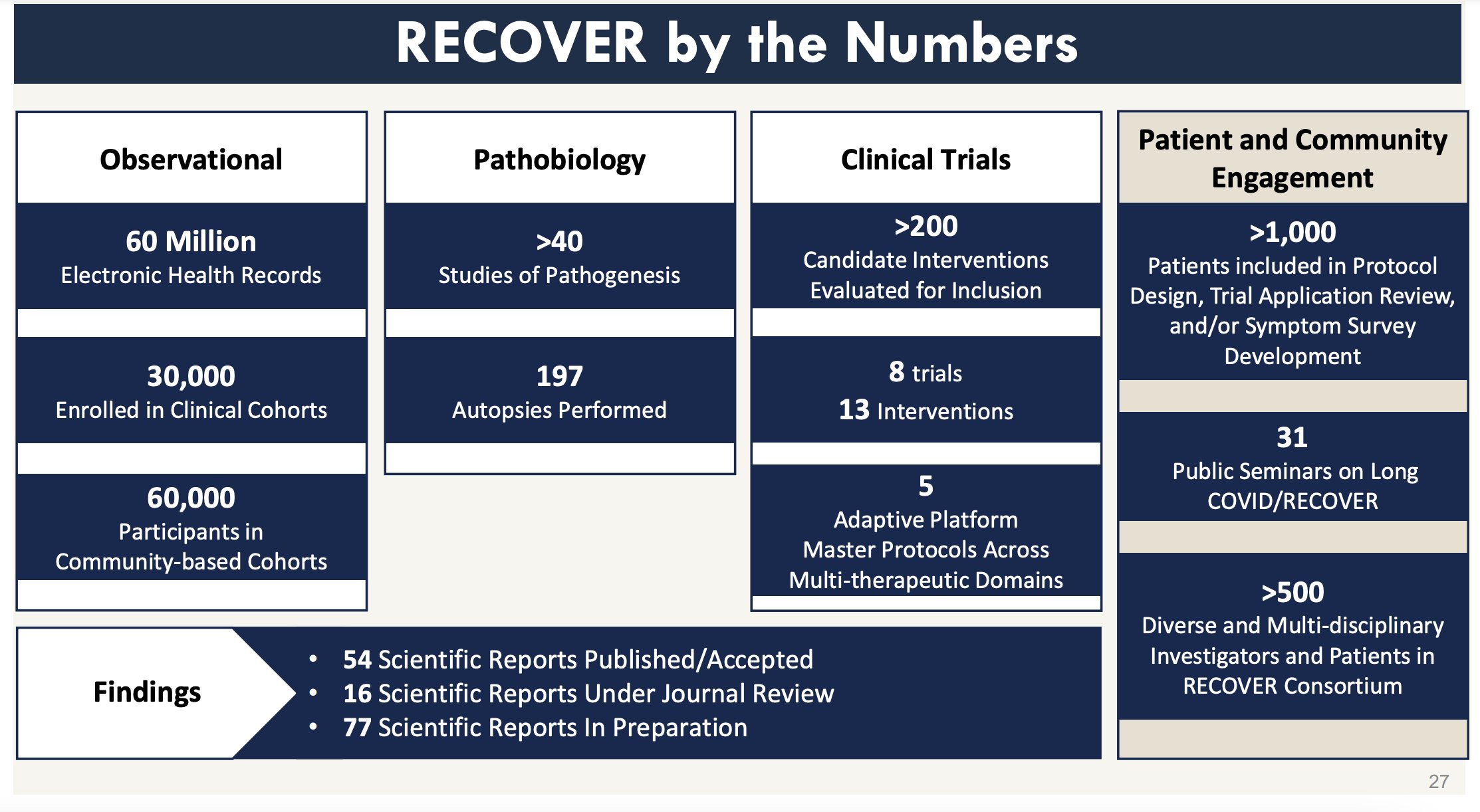As I didn’t see the recordings up yet, I shared
a short thread on Twitter for any that would like to view in the meantime. This is probably duplicative, and mods feel free to delete or move as needed. Sharing if helpful to anyone.
Excerpts:
Koroshetz: “COVID is kind of a natural experiment to get at this problem…this is a once ever opportunity to study this condition..that’s really what our opportunity is here and we want to make the most of it (referring to ME/CFS).”
Koroshetz: “…the worry is we’re going to hit a plateau and end up with a lot of people with Myalgic Encephalomyelitis..”
Gibbons: “..NIAID has been studying ME/CFS for decades, or more, and yet we don’t have FDA-approved drugs for that…so there’s not been a lot of success in this post-infectious chronic condition space…quite frankly, the FDA was challenged with developing a regulatory pathway for biologics…”
Bertagnolli: “I could sit and make a list of 30 different, at least, potential therapeutics to pursue. The honest answer is, we don’t have an answer for you yet. Because, what is going to happen now is a very rapid and intense period of planning for how we strategize with the new resources we’ve received. We received $515 million now to move forward. The focus of that is to produce treatments for this disease. What the best strategy is to achieve that is going to be some intense focus over the next couple months. We’re taking this intense planning activity into the Office of the Director and we’re pulling out all the stops to come up with the smartest possible plan, knowing what we know today. The best possible way to use this new infusion of money we’ve gotten…we really do have a number of solid hypotheses now that can be pursed with clinical trials.”
An attendee asks the panel: “I’m just curious, about the history of ME/CFS…and what that teaches us?”
Koroshetz: “As Gary said, there’s no approved therapy for ME/CFS…the lessons from ME/CFS was, that you’re not going to fix the problem with a lot of small studies. You really need to collect a really well phenotyped cohort, collect the samples, and go at it in a very systemic fashion. We just came back from meetings with the NIAID consortium on ME/CFS…again, there’s lots of findings, but actually which one to put money on is difficult to know. RECOVER was really informed by ME/CFS research."
Bertagnolli: “I’d like to add one thing to that. I think another lesson learned from ME/CFS, is that we need to do better. We really need to do better for people with these chronic post-infectious syndromes. I think the community from people suffering from that disease feel like there hasn't been an urgency towards truly trying to solve that problem. Now that we have this opportunity, we don’t want to waste the opportunity to include them, and make sure that we understand how solve this for that entire community. I think that’s really critical.”
Gibbons: “I’d like to underscore, I think one of the opportunities of the additional funding we’ve been provided with, is to engage with some of those more comparatives studies, and understanding those overlaps. It may be an opportunity to take what we learn in Long COVID and hopefully inform those other post-infection chronic conditions like ME/CFS. I think that’s an opportunity we can do over these next few years with this additional capital."
Koroshetz: "The patients with ME/CFS are incredibly frustrated by the lack of interest by physicians with taking care of them...for years they've been fighting a perception that people don't think they have anything wrong with them...hopefully Long COVID has gotten rid of that…this is clearly an immune disorder, there’s no question about it.”
[Koroshetz then forgets the NASEM title for infectious-associated chronic conditions, asking "what did NASEM call it again?]
Hugh Auchincloss: "We do hope to have a major investigator and patient participation meeting by early in the Fall, to review directions going forward.”
An attendee asks Bertagnolli: "There's skepticism about RECOVER, I don't need to point out the articles. Monica, you're mentioning you put Office of Director into this, is there a new oversight of RECOVER, through the Office of Director? Perhaps speaking out of turn, there's a little bit more of a request for more transparency for how the funds are getting spent. I think it's fair to say."
Bertagnolli: “I’ve seen the list of really amazing manuscripts that will emerge over this summer, finally. I think people will start feeling much better about RECOVER, it’s first wave once the manuscripts really start flowing - and they are definitely coming. I think the other lesson is now - it is an infrastructure on a scale that has never happened before in research, ever. The reason for moving it into the OD, is to get everyone together to now take a look at everything we’ve learned and to come up with a strategy moving forward. RECOVER is not moving into the OD, I misspoke, what’s moving into the OD is this big planning activity. And why did I think that had to land in the OD? Because of how critically important this is as an initiative, that is doing things that we’ve never ever done before - and with the ability to engage with the broader community. Only planning..
I want to signal to the community. I think that’s also really important. We’re signaling to the community, that we built an amazing infrastructure and now we’re going to sit down and take a very deep look at what we’ve learned and then come up with a plan to go forward. And to be very transparent about that, and very clear about that. Frankly, we can be that way now because we’ve learned so much.”



